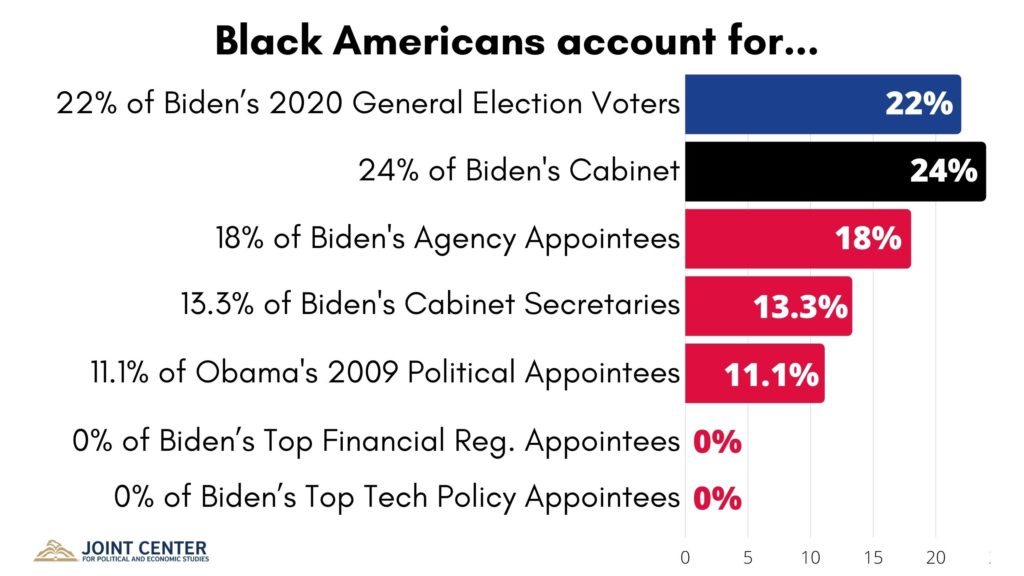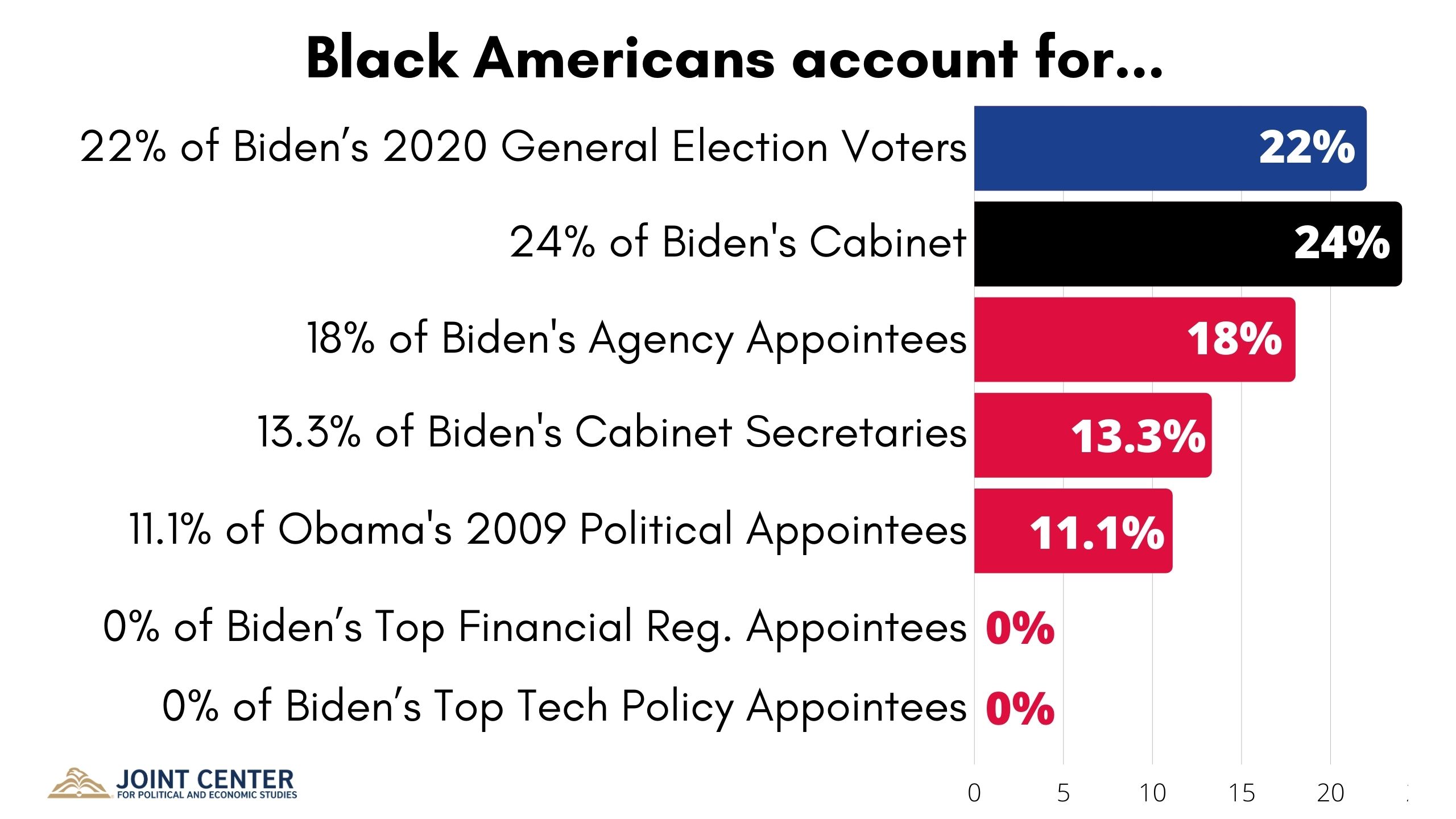Black Talent Initiative

100-Day Report on Black Appointments in Biden Administration
Today, the Biden Administration reported on its progress over the first 100 days, and announced that of “the approximately 1,500 agency appointees hired by President Biden so far… 18% identify as Black or African American.” It did not disclose the percentage of leadership positions held by African Americans, such as nominations for Senate-confirmed positions, or appointments to senior executive service or senior White House positions.
The Biden Administration’s accomplishments on Black nominations and appointments include a number of “firsts” (e.g., Vice President, Defense Secretary, Council of Economic Advisers Chair), five Black deputy secretaries, three Black women appellate judge nominees, and a cabinet that is 24% African American.
The Biden Administration has several areas for improvement. African Americans made up 22% of President Biden’s 2020 general election voters, and are almost non-existent as appointees in Republican Administrations (which often do not view Black communities as base voters). A failure to increase Black representation among appointees at all levels (leadership, mid-level, and entry-level) will result in overall Black underrepresentation. The Biden Administration must also do more to increase Black representation in economic and tech policy top leadership positions, ensure more Black representation in the less visible but critical Assistant Secretary and Senior Executive Service leadership positions (which are “feeder” positions for future leadership opportunities), and disaggregate and disclose data on Black representation by positions, agency, and gender.
In response to the release, Joint Center President Spencer Overton issued the following statement: “Too often, African Americans have been underrepresented in both Democratic and Republican administrations. We appreciate the Biden Administration’s stated commitment to ensure African Americans are fairly represented and many of their accomplishments. However, notwithstanding these efforts, the glaring absence of Black representation in economic and tech policy top leadership positions and inadequate Black representation in critical Assistant Secretary and Senior Executive Service leadership positions are unacceptable. As evidenced by the data, there is much more work to ensure fair representation and racial equity for Black communities. We look forward to working with the President and his team to increase Black representation in his Administration.”
Numbers on Black Appointments 100 Days into the Biden Administration
According to the Biden Administration, after 100 days 18% of its agency appointees identify as Black or African American. By comparison, African Americans were 22% of the voters who cast ballots for Joe Biden in the 2020 general election, and over 54% of the Georgia voters who supported the Democratic Senate candidates in the 2021 runoff election that allowed Democrats to control the Senate and the confirmation process.

While assessing the diversity of the high-profile cabinet is relatively straightforward, the Biden Administration did not release key data that would allow an assessment of Black representation in critical subcabinet and other leadership positions at agencies and in the White House (see below). Too often, elected officials that fail to disaggregate this data obscure that their racial diversity is concentrated in support roles and that their leadership has little Black representation. For example, in June 2020 Senate Democrats reported data showing that the average Democratic Senate personal office had a staff that was 13.7% Black. In August 2020, however, the research of Dr. LaShonda Brenson of the Joint Center revealed that African Americans accounted for only 5% of Democratic Senate personal office top staffers (chiefs of staff, legislative directors, and communications directors).
Lack of Data on Black Leadership
The Biden White House has not released the percentage of its nominations and appointments to key leadership positions who are African Americans, including:
- Nominations for Senate-confirmed positions
- White House Assistant to the President appointments
- Principal Deputy Assistant Secretary-level appointments
- Non-Career Senior Executive Service appointments
Accomplishments
With regard to Black appointments, the Biden Administration has enjoyed several “firsts,” including:
- Kamala Harris as the first Black woman Vice President
- General Lloyd Austin as the first Black Secretary of Defense
- Cecilia Rouse as the first African American to chair the Council of Economic Advisers
- Michael Regan, the first Black male to lead the Environmental Protection Agency
- Nominating Stacey Dixon to serve as the Principal Deputy Director of National Intelligence, which would make her the first Black person to serve in such a senior position in the intelligence community
- Nominating Kristen Clarke as Assistant Attorney General of the Justice Department’s Civil Rights Division, which would make her the first Black woman to serve in the position
- Nominating Kenneth Polite as Assistant Attorney General of the Justice Department’s Criminal Division, which would make him the first African American to serve in the position during a Democratic administration.
African Americans account for 24% of Biden’s full cabinet (6 of 25).
President Biden also nominated African Americans to serve in the Deputy Secretary (number two) position at five agencies — Jewel Bronaugh at Agriculture, Don Graves at Commerce, Adrianne Todman at Housing and Urban Development, Adewale “Wally” Adeyamo at Treasury, and Donald Remy at Veterans Affairs.
In his initial rollout of three appellate judges, President Biden appointed Black women to all three positions.
Areas for Improvement
The Baseline for Black Representation is 22%: To ensure African Americans are fairly represented in the Biden Administration, African Americans should account for at least 22% of appointments in positions at all levels (leadership and support). While African Americans make up 13.4% of the U.S. population, they are a tiny fraction of appointees in Republican administrations—too many of which have not counted Black voters as a significant component of the Republican voting base. For example, in his final year in office in 2008, 3.8% of President George W. Bush’s political appointees were African American (we do not yet have this data for the Trump Administration, although we do know that none of Donald Trump’s 54 federal appellate nominees were Black). Democratic administrations that aspire to Black appointments of just over 13% are complicit in ensuring that African Americans will continue to be underrepresented in political appointments over time.
More Black Leadership in Economic Agencies: As illustrated in the chart above, African Americans account for none of President Biden’s top financial regulator appointments, even though they historically have been underrepresented in these positions (e.g., heads of the Commodity Futures Trading Commission, the Consumer Financial Protection Bureau, the Federal Reserve, the Federal Deposit Insurance Corporation, the Office of the Comptroller of the Currency, the Federal Housing Finance Agency, the National Credit Union Administration, and the Securities and Exchange Commission). To date, none of President Biden’s appointments to lead these agencies have been Black (CFPB, NCUA, and SEC), the current open slots are the heads of the CFTC and the OCC, and the leaders of the other agencies either have not yet concluded their terms (the Federal Reserve, FDIC) or have not yet been required to leave (FHFA).
Additionally, the Biden Administration should appoint African Americans to top economic positions at Treasury (e.g., Assistant Secretary for Financial Markets and the Assistant Secretary for Financial Institutions), Commerce (e.g., Under Secretary of Commerce for International Trade, Minority Business Development Agency Director, Economic Development Administration leadership), and the open Governor position on the Federal Reserve Board, as well as nominate Shalanda Young to serve as Director of the Office on Management and Budget (she is currently the Acting Director and has been confirmed by the Senate as Deputy). At this critical moment, Black communities have been devastated by the economic impact of the pandemic, and economic policy has too often exuded a veneer of mathematical objectivity while ignoring the persistent legacy of racial inequity woven into the fabric of the U.S. economy since its inception. These systemic failures are only exacerbated by the underrepresentation of African Americans in political leadership and among staff (e.g., this New York Times analysis found that only 0.5 percent of the Ph.D. economists on staff at Federal Reserve in Washington are Black).
More Black Leadership in Tech Positions: The Biden Administration has emphasized dismantling systemic inequality, and Black representation in key tech policy positions is also critical to shaping an equitable future. Closing the digital divide, preventing algorithmic bias in the collection and use of data, and tackling many other challenges will shape the future of race in the United States. As illustrated by the chart above, African Americans account for none of President Biden’s top tech appointments so far (White House Office of Science and Technology Policy Director and National Cyber Director). He should shift course and ensure strong Black representation among his nominations for the Assistant Secretary of Commerce for Communications and Information (head of the National Telecommunications and Information Administration), Federal Communications Commission Chair, Federal Trade Commission Chair, and U.S. Chief Technology Officer.
More African Americans in Key Feeder Leadership Positions: A key component to ensuring that there are African Americans in leadership positions in the future is to ensure that they are adequately represented in “feeder” positions. The Biden Administration needs to assess each agency and ensure African Americans are sufficiently represented in key Assistant Secretary positions, which can be critical stepping stones in gaining experience to serve as Deputy Secretary or Secretary. For example, while there are no African Americans in the top three positions at the Department of Justice, the Biden Administration nominated Ken Polite to be Assistant Attorney General of the Criminal Division, which serves as a credible feeder position to Attorney General or Deputy Attorney General. The same assessment needs to be made of African American representation in Principal Deputy Assistant Secretary and Deputy Assistant Secretary positions (often the top non-Senate confirmed position in an office), to ensure there are adequate Black Assistant Secretary candidates in the future. Unfortunately, right now it seems as not one Black person serves in the role of Principal Deputy Assistant Attorney General in any of the many divisions and offices of the Department of Justice.
Disaggregate and Disclose Data: The lack of disaggregation allows the Biden Administration to frame the data positively, but to identify challenges and ensure true Black representation the Administration needs to do a better job of disaggregating and disclosing data in real-time.
- Disaggregate by position: We need to understand what percentage of African Americans are in leadership positions—such as Senate-confirmed positions and non-career senior executive service positions—and what percentage are in more junior Schedule C positions. In September 2009 in the Obama Administration, for example, African Americans were about 13.3% of Schedule C positions but only about 9% of Senate-confirmed and other senior executive positions. We also need disaggregated data on particular positions like the ambassadorial nominees who are not career foreign service appointments—the names mentioned in this Washington Post story suggest a significant lack of African American representation among this group.
- Disaggregate by agency: Black underrepresentation among appointments at economic agencies, the State Department, and the Defense Department is obscured by the Administration’s failure to disaggregate demographic data by agency. Failure to address these weaknesses now—including in junior and mid-level positions—means that in the future the Biden Administration and other Democratic administrations will have a smaller pool of experienced Black talent for top leadership positions.
- Disaggregate by gender: Studies show significant bias against Black males in society generally (e.g., Stanford economist Raj Chetty), and in employment. We have heard many complaints about significant Black male underrepresentation in particular jobs (e.g., the top decisionmaking roles on domestic policy, White House staff) in the current Administration, but because the Biden Administration did not release data disaggregated by race and gender it is difficult for the Administration to refute these claims.
To see all of the Joint Center’s report cards examining the Biden administration’s performance on Black appointments, click here.

